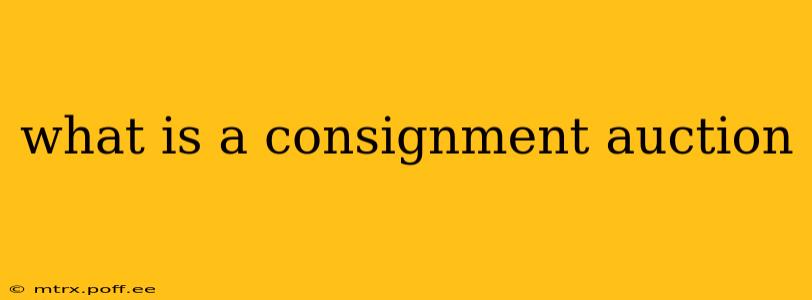A consignment auction is a type of auction where the auctioneer sells goods that are owned by someone else, the consignor. The auctioneer acts as an agent, receiving a commission or fee for their services in selling the items on behalf of the consignor. This differs from a traditional auction where the auctioneer is selling their own goods. Understanding the ins and outs of consignment auctions is crucial for both sellers and buyers looking to navigate this unique market.
How Does a Consignment Auction Work?
The process typically involves these steps:
-
Consignment Agreement: The consignor and the auctioneer sign a contract outlining the terms of the sale. This includes details such as the items to be sold, the commission rate (often a percentage of the final sale price), the reserve price (minimum acceptable price), the auction date, and payment terms.
-
Item Appraisal and Cataloguing: The auctioneer appraises the items to determine their estimated value and prepares a catalog, often including photographs and descriptions, that's distributed to potential buyers. This catalog is essential for attracting bidders and setting expectations.
-
Marketing and Promotion: The auction house promotes the auction to attract buyers, utilizing various channels such as online listings, print advertising, and social media. Successful marketing is key to driving up competition and maximizing sale prices.
-
Auction Day: On the day of the auction, the auctioneer presents the items to the bidders, facilitating the bidding process. They ensure fair and transparent bidding practices.
-
Payment and Settlement: After the auction, the auctioneer collects payment from the buyers. They then deduct their commission and other expenses before remitting the remaining proceeds to the consignor. This often involves a payment schedule agreed upon in the consignment agreement.
What are the Advantages of Using a Consignment Auction?
For consignors, consignment auctions offer several compelling advantages:
- Wider Reach: Auction houses often have extensive networks of potential buyers, leading to greater exposure for the items being sold than through other sales methods.
- Faster Sales: Compared to selling items privately, auctions typically result in a quicker sale.
- Competitive Bidding: The auction format drives up prices through competitive bidding, potentially leading to higher sale prices than selling privately.
- Convenience: Auction houses handle much of the marketing, logistics, and payment processing, offering convenience to the consignor.
What are the Disadvantages of Using a Consignment Auction?
While consignment auctions offer numerous benefits, they also come with potential drawbacks:
- Commission Fees: Auction houses charge a commission, which reduces the consignor's final profit.
- Reserve Prices: If the reserve price isn't met, the item may not be sold at all.
- Uncertainty of Sale Price: The final sale price can be unpredictable, which can be a concern for consignors seeking a specific price.
- Auction House Selection: Choosing a reputable and trustworthy auction house is crucial to avoid potential issues.
What Types of Items are Sold at Consignment Auctions?
Consignment auctions encompass a broad range of items, including:
- Antiques and Collectibles: This is a common category, including furniture, art, jewelry, and other valuable items.
- Estate Sales: When individuals pass away, their belongings are often sold through consignment auctions.
- Real Estate: While less common than other items, real estate can also be sold through consignment auction.
- Vehicles: Classic cars and other vehicles are frequently sold at consignment auctions.
- Art and Fine Art: Auction houses specializing in art frequently handle consignment sales.
How do I choose a Consignment Auction House?
Selecting the right auction house is paramount. Consider:
- Reputation and Experience: Research the auction house's history, looking for reviews and testimonials.
- Specialization: Some auction houses specialize in specific types of items. Choose one that aligns with what you're selling.
- Commission Rates: Compare commission rates offered by various auction houses.
- Marketing Strategies: Inquire about their marketing plans to reach potential buyers.
What is the difference between a consignment auction and a private sale?
The key difference lies in the sales process and reach. Private sales involve direct negotiations between the buyer and seller, offering more control over the price but potentially limited reach. Consignment auctions provide broader exposure and competitive bidding but involve commission fees and less control over the final price.
What are the fees involved in a consignment auction?
Fees typically include a commission (percentage of the final sale price), marketing fees (sometimes), and other possible administrative charges. These fees should be clearly outlined in the consignment agreement.
By understanding the intricacies of consignment auctions, both sellers and buyers can navigate this market effectively, maximizing potential benefits while mitigating potential risks. Remember to always thoroughly research any auction house before consigning your items.
